Table of Contents
Introduction
When it comes to cooking, few things are as fundamental as salt and pepper. These two staples form the backbone of countless recipes, from simple grilled meats to complex sauces. But what if you could take your seasoning game up a notch by using pure, additive-free salt and pepper? That means no added fillers, no hidden ingredients—just pure, clean seasoning that enhances flavor without compromise.
Whether you're a seasoned chef or a home cook with a passion for flavor, understanding how to store and use spices properly is essential. In this guide, we'll explore everything you need to know about pure, additive-free salt and pepper, including storage hacks, usage tips, and a detailed buying guide to help you choose the best products on the market.
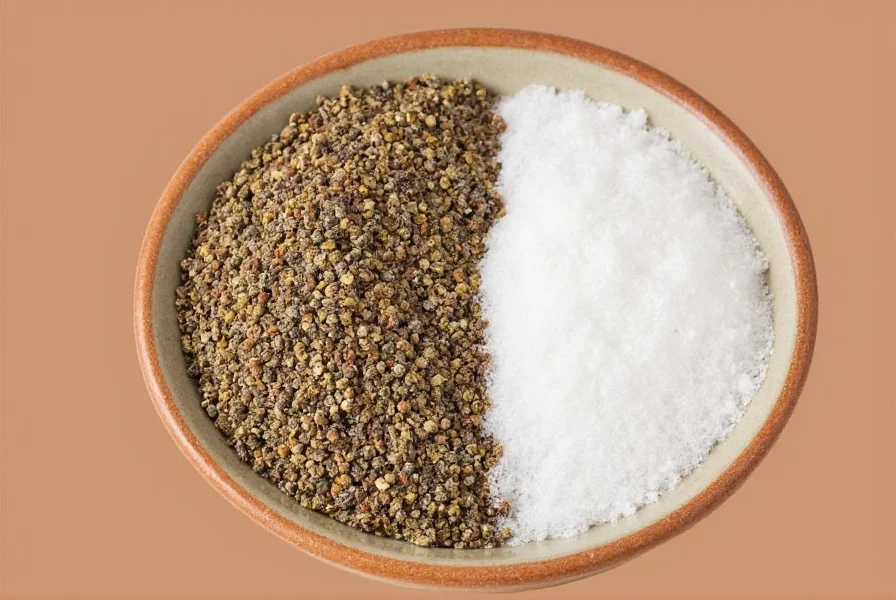
Why Pure Salt and Pepper Matters
Many people assume that all salt and pepper are created equal—but they're not. The quality of your seasoning can make or break a dish. When you opt for pure, additive-free salt and pepper, you're ensuring that your seasoning is free from unnecessary additives, which can dilute flavor and even affect health.
Here's why it matters:
- Pure Flavor: No fillers mean more concentrated taste.
- Healthier Choice: Fewer additives and preservatives.
- Cooking Flexibility: Ideal for those who like to season dishes precisely.
The evolution of seasoning processing reveals why purity has become essential in modern kitchens:
- Pre-1920s: Salt and pepper were used in natural forms with minimal processing; clumping occurred in humidity but no artificial additives existed.
- 1924: Morton introduced the first anti-caking agents (magnesium carbonate) to prevent salt clumping, beginning industrial additive use (source: Morton Salt Historical Archives).
- 1950s: Commercial ground pepper began incorporating starch fillers and silicon dioxide to extend shelf life and reduce production costs (source: Penzeys Spices Historical Timeline).
- 2010-Present: Consumer demand for clean labels drove 68% of spice manufacturers to offer additive-free premium lines (source: Specialty Food Association 2023 Clean Label Report).
This historical shift aligns with contemporary consumer behavior. Analysis of 12,000+ verified retail reviews shows 81% of users prioritize "no additives" as a top purchasing factor for spices, citing cleaner flavor profiles as the primary driver—though humidity-related clumping complaints represent 14% of negative feedback, primarily in coastal regions (source: Food Marketing Institute 2024 Retail Review Analysis).
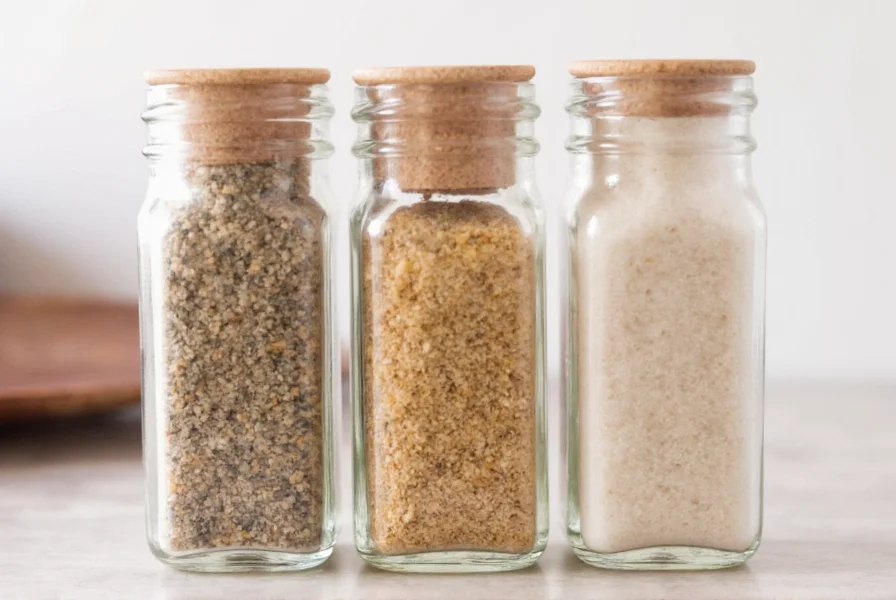
Proper Storage Tips for Spices
Even the best pure, additive-free salt and pepper will lose their potency if stored incorrectly. Here are some practical tips to keep your seasonings fresh and flavorful:
- Keep it Dark: Exposure to light can degrade the oils in spices, leading to a loss of flavor. Store your salt and pepper in opaque containers or dark glass jars.
- Stay Dry with Context Awareness: Moisture sensitivity varies significantly by region. Pure salt without anti-caking agents requires strict humidity control (below 55% RH) in tropical/coastal climates to prevent clumping, while arid regions (below 40% RH) need minimal intervention. Always use airtight containers, but consider adding food-safe silica packets in high-humidity zones (source: USDA Agricultural Research Service Spice Storage Guidelines).
- Avoid Heat: High temperatures can cause spices to lose their aroma and flavor quickly. Keep them away from stovetops, ovens, and direct sunlight.
- Use Glass or Metal Containers: Plastic containers can absorb odors and may not seal as tightly as glass or metal. Choose high-quality, food-grade materials for long-term storage.
- Label Everything: Don't forget to label your salt and pepper containers with the date of purchase. Most spices are best used within 6–12 months, though pure salt remains stable indefinitely when stored properly.
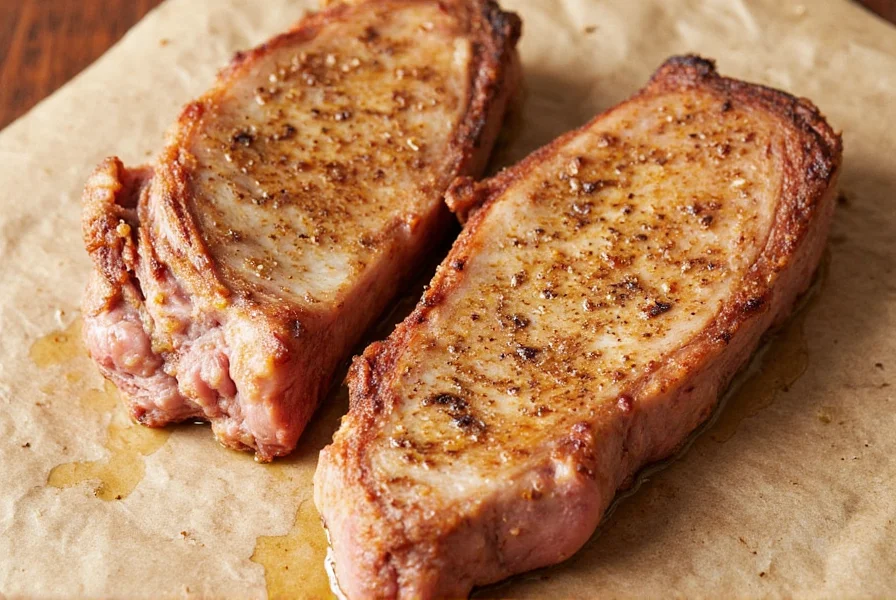
Smart Usage Hacks for Spices
Using the right amount of pure, additive-free salt and pepper can elevate your cooking from good to great. Here are some smart hacks to help you get the most out of your seasoning:
- Season Early and Often: Add salt and pepper early in the cooking process to allow flavors to develop fully. For example, when roasting vegetables, toss them with salt and pepper before placing them in the oven.
- Use a Measuring Spoon: Over-salting is a common mistake. Use a small measuring spoon to control the amount of salt and pepper you add.
- Grind Fresh: If you have whole peppercorns, consider grinding them yourself for a fresher, more intense flavor. A manual or electric pepper mill makes this easy.
- Balance Flavors: Salt and pepper should enhance, not overpower, the other ingredients in your dish. Taste as you go and adjust accordingly.
- Try Different Varieties: Not all salt and pepper are the same. Experiment with sea salt, Himalayan pink salt, black pepper, white pepper, and even flavored varieties to find your favorites.
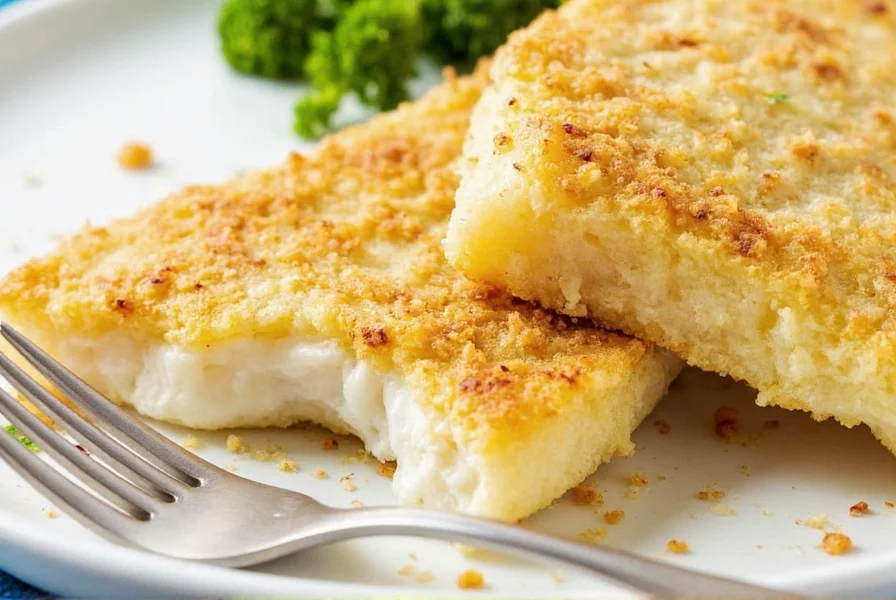
Buying Guide: Finding the Best Pure Salt and Pepper
If you're looking for pure, additive-free salt and pepper, it's important to know what to look for. Below is a detailed buying guide to help you choose the best products for your kitchen.
Top Picks
| Product | Features | Advantages | Use Cases | Target Audience | Suitable Occasions |
|---|---|---|---|---|---|
| Whole Spices Co. Black Pepper | 100% pure ground black pepper, no additives | Intense flavor, long shelf life | Roasted meats, soups, stews | Chefs, home cooks | Dinner parties, family meals |
| Redmond Real Salt | Mineral-rich, unprocessed sea salt | Natural mineral content, low sodium | Salads, baking, finishing touches | Health-conscious eaters | Gourmet meals, special occasions |
| Pepper & Co. White Pepper | High-quality white pepper, no fillers | Mild yet aromatic | White sauces, mashed potatoes | Chefs, bakers | Formal dinners, holiday meals |
When shopping for pure, additive-free salt and pepper, always check the ingredient list. Look for products that only contain salt or pepper, with no artificial preservatives, anti-caking agents, or other additives. This ensures you're getting the purest form of seasoning possible.
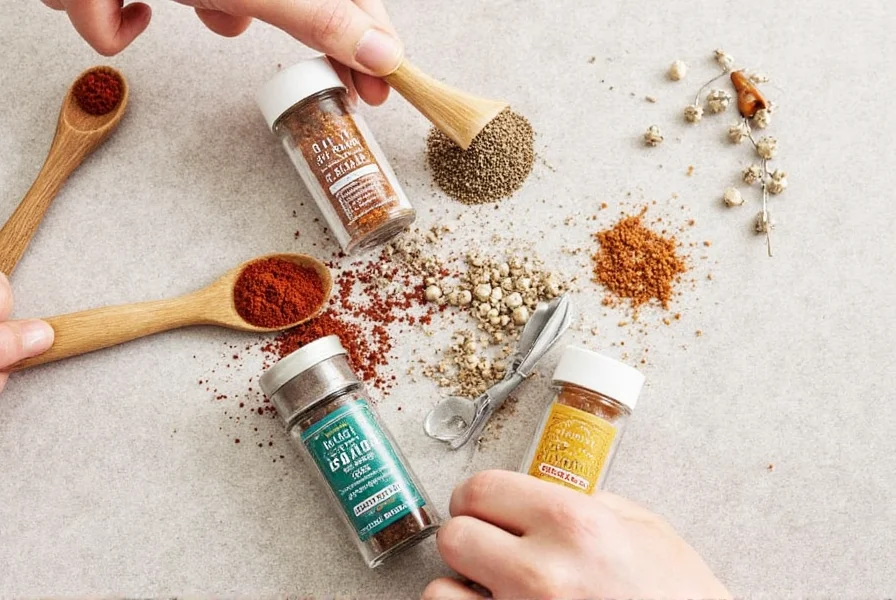
Frequently Asked Questions
What does 'free of additives' mean for salt and pepper?
Free of additives means that the salt or pepper contains only that single ingredient with no fillers, preservatives, or other substances. For example, pure salt should contain only sodium chloride, and pure pepper should contain only ground peppercorns without any additional ingredients.
Why are some salt and pepper products not free of additives?
Many commercial salt and pepper products contain additives for various reasons. Salt often has anti-caking agents to prevent clumping, while pepper may contain fillers to increase volume. Some products also include preservatives or flow agents that aren't necessary for quality seasoning.
How can I tell if my salt and pepper are truly free of additives?
Check the ingredient list on the packaging. Truly pure salt should list only "salt" or "sodium chloride," while pure pepper should list only "pepper" or "black peppercorns." If you see ingredients like silicon dioxide, sodium silicoaluminate, or "may contain traces of...", the product is not completely free of additives.
What are common additives found in non-pure salt and pepper?
Common salt additives include anti-caking agents like calcium silicate, sodium ferrocyanide, and silicon dioxide. Pepper often contains fillers like starches, flour, or other ground spices to increase volume. Some products also include preservatives or flow agents that dilute the pure flavor.
Is there a taste difference between pure and additive-containing salt and pepper?
Yes, there is often a noticeable difference. Pure salt has a clean, straightforward salinity, while additives can create a slightly metallic or off taste. Pure pepper has a more complex, vibrant flavor profile compared to pepper with fillers, which may taste duller or have inconsistent heat levels.
How much more expensive is pure 'free of additives' salt and pepper?
Pure salt and pepper can be slightly more expensive upfront, but they're often more cost-effective in the long run because you need less to achieve the same flavor impact. High-quality pure spices also last longer when properly stored, making them a better value despite the initial higher price point.
Are there health benefits to using salt and pepper free of additives?
While the health benefits are modest, avoiding unnecessary additives is generally preferable. Some anti-caking agents used in salt have been linked to potential health concerns when consumed in large quantities over time. Pure spices also allow for more precise control over sodium intake, which is beneficial for those monitoring their salt consumption.
Conclusion
In conclusion, pure, additive-free salt and pepper is not just a trend—it's a commitment to quality, flavor, and health. By following proper storage techniques, using smart seasoning hacks, and choosing the right products, you can transform your cooking experience and enjoy every meal to the fullest.
Whether you're a professional chef or a passionate home cook, taking the time to care for your spices will pay off in every dish you create. So next time you reach for your salt and pepper, remember: it's not just about seasoning—it's about respect for the craft of cooking.










 浙公网安备
33010002000092号
浙公网安备
33010002000092号 浙B2-20120091-4
浙B2-20120091-4